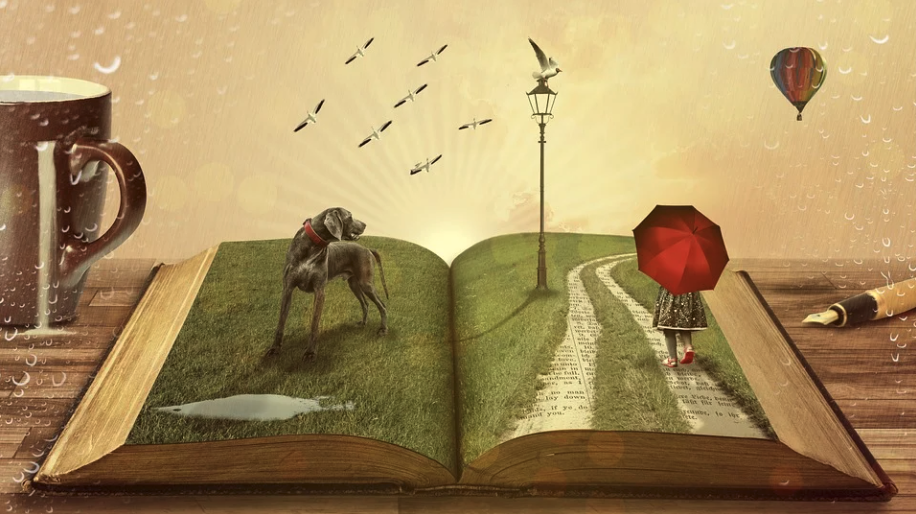
When was the last time you found yourself absorbed in a wonderful book? In today’s fast-paced world, such pleasures may seem like a luxury. But deep reading is a powerful practice. It takes time. But that time is repaid in meaningful psychological benefits.
The moral philosopher Martha Nussbaum once warned that “It would be catastrophic to become a nation of technically competent people who have lost the ability to think critically, to examine themselves, and to respect the humanity and diversity of others.”
She was quite right. And her concern has doubtless grown over the last few years. We live in a hyperactive world. Yet our brains are still largely wired for hunter-gatherer life.
Tuning out to tune in

In order to slow down and think critically, the first thing we often need to do is turn things off. Our TV, radio, social media, phone, etc. Whatever it is that fills your day with noise needs to be silent. Once you do that, notice how long it takes for you to turn it back on. Or at least to want to.
Our brains are wired to pick up on potential rewards. The “dopamine kick” associated with finding food or good shelter or a partner used to be a rare thing in our life. Now, we get simulated rewards like this with every new notification, with every scroll of the timeline or scan through the news site.
Our attention has been highjacked by all of this stimulus. And companies are happy to make a profit from it. They have the best minds, including many psychologists, enlisted in keeping us hooked. We need to turn it off.
Simplify our inputs
Another friend of mine often sites this wisdom from Herbert Simon, “a wealth of information creates a poverty of attention.”
In order to hone our attention, we need to cut out information. This goes counter to many of our societal beliefs, where information is seen as essential. But without the ability to find the relevant bits in the sea of information, we will be lost. Wisdom is found in setting aside the irrelevant in our lives.
Like art and great buildings
Research by cognitive scientists and neuroscientists have found that deep reading is a distinctive experience. It is qualitatively different from the kind of skimming and bouncing around we do on social media and other online media. It is immersive, slow, and rich in details. It touches our feelings and can make us rethink our lives. At its very best, it is profound.
The sort of deep, “ah-ha” moments that come from deep reading are nothing like the superficial responses we can have on Twitter and Facebook.
Moving slowly through a text, often at a perfect stop, we sink in. It is like creating great art. Each new move requires some evaluation. At times a stroke near the end will lead us to re-evaluate the beginning. We read a paragraph and recall something several pages or chapters back. Perhaps we have even marked up the page in our book. Interacting like this, we change not only the book but also ourselves.
Those of us who have lived in a town for a while know how attached we can become with buildings. They are more than bricks and wood. They are landmarks. They are memories. They are markers of a past and they offer us direction into the future.
As cities develop and destroy old buildings, they erase these memories and cut short paths we might have taken. Most distressing is when cities become carbon copies of one another, mimicking building styles and corporate logos. Superficially, this simplifies navigation and recognition. But it also erases character and identity.
Reading deeply
Similarly, if the words in our world are constantly flowing in and out, we fail to develop character and identity. News and social media trigger us, often on the most basic levels of reward and disgust. But they never give us depth. We don’t get to know the deep story of the person behind the news. We don’t ever get to feel the context of the situation.
Through deep reading we immerse ourselves into a text. We develop a relationship not only with the characters, but with the author. We truly share in another person’s world.
Psychologists have found that people who read regularly for pleasure show greater empathy than those who don’t. This may be counterintuitive. After all, empathy is for other people and readers are spending more time in books. But this deep reading builds the kind of relationships that transform into empathy in everyday life.
Conversely, spending more time on the internet on social media does the opposite. It wires us toward great superficiality. It also disconnects us from others and ourselves. Studies have found that this leads to depression and anxiety.
Living deeply

Much of this depression and anxiety can be connected to our chasing of pleasures and the effects this has on our brains. Habituating ourselves to chase pleasures, get rewards, and chase again leads to burnout.
On the other hand, if we train our brains to read deeply, sinking into a text, we find that the pleasure we gain lasts for hours, perhaps days at a time. Sometimes it even lasts longer. In some cases, deep reading can offer a psychological or spiritual epiphany that lasts for months or years.
In this way, great books can change our lives the way certain towns shape and change our lives. They give us character. And in turn, we preserve them and hope to pass them down to the next generation. Today’s news will be forgotten tomorrow. Great books, great buildings, and great places will live on.
 Justin Whitaker, Ph.D., holds a doctorate in Buddhist ethics from the University of London. He has given lectures, and taught Buddhist studies and Philosophy at Oxford University, the University of Hong Kong, the University of Montana, and at Antioch University’s intensive study-abroad program in India. A certified meditation teacher, he is a regular contributor to Patheos.com, and Senior Correspondent for Buddhistdoor Global. He lives in Missoula with his family.
Justin Whitaker, Ph.D., holds a doctorate in Buddhist ethics from the University of London. He has given lectures, and taught Buddhist studies and Philosophy at Oxford University, the University of Hong Kong, the University of Montana, and at Antioch University’s intensive study-abroad program in India. A certified meditation teacher, he is a regular contributor to Patheos.com, and Senior Correspondent for Buddhistdoor Global. He lives in Missoula with his family.
